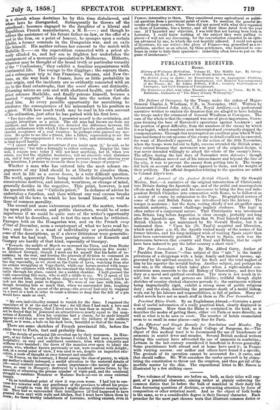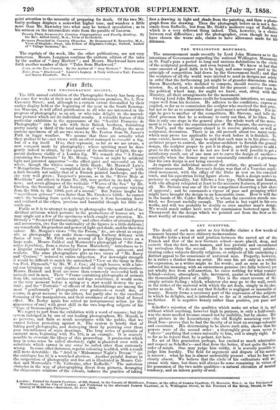PUBLICATIONS RECEIVED.
Boors.
History of Wesleyan Methodism. Volume II. The Middle Age. By George Smith, LL.D., F.A.S., Member of the Royal Asiatic Society.
The British Army in India ; its Preservation by an Appropriate Clothing, Housing, Locating, Recreative Employment, and Hopeful Encouragement of the Troops, Soc. By Julius Jeffreys, F.H.S., formerly Staff-Surgeon of Cawnpore, and Civil Surgeon of Futteghurgh.
The Strawberry Girl, with other Thoughts and Fancies, in Verse. By H. M. Rathbone, Authoress of "The Diary of Lady Willoughby."
The Defence of Cawnpore, by the Troops under the orders of Major- General Charles A. Windham, C.B., in November, 1857. Written by Lieutenant-Colonel John Ady e, C.B., Royal Artillery.—A professional narrative written to explain the disasters that are alleged to have befallen the troops under the command of General Windham at Cawnpore. The sum of the whole is that the command was one of great importance, Cawn- pore forming the base of Havelock's operations against Lucknow ; and the position of great difficulty, from the numbers of the enemy by which it was begirt, which numbers soon interrupted and eventually stopped the communications. Through this interruption an excellent plan which Wind- ham had formed to cut up some of the enemy in detail could not be executed, for want of Havelock's approval. In the action of the 26th November, when the troops were led out to fight, success attended the British arms ; they retired because that movement was part of the original design, it was never intended willingly to attack the whole of the enemy's force. The affairs during the last days of November were defensive : though General Windham moved out of his intrenchment and beyond the line of the city, it was to prevent the enemy from getting into it. The troops fell back on account of the numbers opposed to them, and the weight of their artillery. The official despatches relating to the question are added to Colonel Adye's text.
A Short Account of the Ancient British Church. By Sir Oswald Mosley, Bart.—A narrative of the original introduction of Christianity into Britain during the Apostolic age, and of the artful and unscrupulous efforts made by Augustine and his successors to bring the free and inde- pendent British Churches into communion with Rome, to be followed as a matter of course by submission to the Pope. Biographical notices of some of the real British Saints are introduced into the history. The temper is moderate ; but the facts, resting chiefly if not altogether upon monkish authority, cannot challenge implicit credence. The logic is often rather of a conjectural nature. That Christianity was introduced into Britain long before Angustine is clear enough ; probably not long after the Apostolic age. The notion that St. Paul himself founded the British Church is not maintained by Sir Oswald Mosley, but it is insinuated thus. " Upon his (St. Paul's) acquittal and liberation which took place A..D. 63, the Apostle visited many of the scenes of his former labours, and his long-indulged wish of visiting Spain might then have been conveniently gratified. If he went to Spain, such was the intercourse between that country and Gaul and Britain, that he might have been induced to pay the latter country a short visit."
The Poor Incumbent. A Tale. By Mrs. Alfred Gatty, Author of " Parables from Nature."—One subject of this " tale " is the family privations of a clergyman with a large family and limited income, ag- gravated by his spiritual anxieties for his flock and the total neglect of him by his superior the invalid bishop. Another subject, and perhaps the real one, is the change which takes place when a right-minded con- scientious man succeeds to the old Bishop of Glastonbury, and does his duty as a moral and spiritual overlooker. The story is not much in it- self; but the scenes and persons are lifelike ; truthful though slight sketches of country clerical character pervade it ; the sentiments without being impracticably rigid, exhibit a strong sense of public religious duty ; and the close, describing the premature death of a model bishop, worn out by his labours and responsibilities, is full of pathos. Many so- called novels have not so much stuff in them as The Poor Incumbent.
Practical Rhine Guide. By an Englishman Abroad.—Contains a great. deal of useful information of a really practical kind, clearly displayed in a small compass. More than the Rhine is contained in the book, as it describes the modes of getting there, either via Paris or more directly, as well as what is to be seen en route. The number of hotels enumerated seem to us small in some places—only four for Paris.
An Efectual and Simple Remedy for Scarlatina and Measles. By Charles Vitt, Member of the Royal College of Surgeons, &c.—The object of this medical tract is to recommend the use of bicarbonate of ammonia in scarlet fever and measles. Several British medical writers during this century have advocated the use of ammonia in scarlatina ; Lettsom in the last century considered it beneficial in fevers generally. Some practitioners both abroad and at home have used it; in France with varying success : our author and others have found it a specific. The grounds of its operation cannot be accounted for ; it cures and that should suffice. Mr. Witt considers the modes operandi is by stimu- lating the constitution to throw out the eruption, and thus get rid of the morbific matter by the skin. The expositional letter to Mr. Simon is illustrated by a few striking cases.
Two volumes of Sermons are before us, both, as their titles will sug- gest, of a practical character, aiming rather at plainly enforcing the common duties that lie before the bulk of mankind in their daily life than discussing questions of doctrine, or attracting attention by force of composition or other artistical merit. And as the object of both books is the same, so to a considerable degree is their literary character. Each preacher for the most part chooses texts that illustrate common duties or point attention to the necessity of preparing for death. Of the two Mr. Gatty perhaps displays a somewhat higher tone, and wanders a little more than Mr. Rawnsley into what may be termed speculation ; as in his sermon on the intermediate state from the parable of Lazarus.
Twenty Plain Sermons for Country Congregations and Family Reading. By the ilev. Alfred Getty, M.A., Vicar of Ecclesfteld.
Sermons Preached in Country Churches. By Drummond B. Rawnsley, M.A., Vicar of Shiplake, Oxon, late Fellow of Magdalen College, Oxford, Author of " Village Sermons," &c.
The reprints of the week, like the other publications, are not very numerous. Messrs. Longman continue the uniform edition of the tales by the author of "Amy Herbert" ; and Messrs. Blackwood have sent forth another number of their "Tales from Blackwood."
kora, or the Two Cousins. By the Author of " Amy Herbert." New edition. Tales from" Blackwood." Lazaco's Legacy. A Story without a Tail. Faustus and Queen Elizabeth. No. 4.



































 Previous page
Previous page